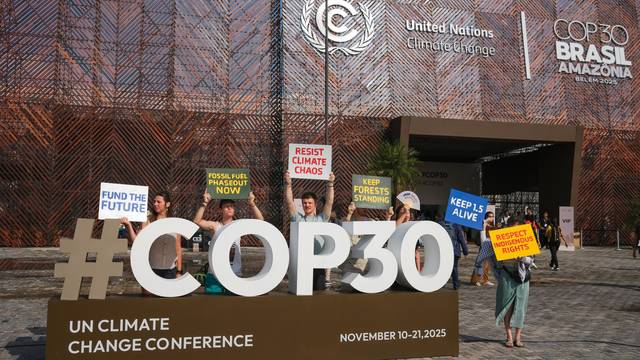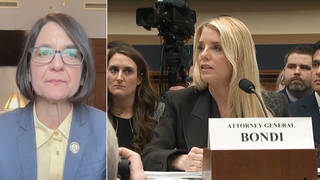
By Amy Goodman & Denis Moynihan
The United Nations’ COP30 climate summit in Belém, Brazil, known as “the Amazon COP,” wrapped on November 22nd. Powerful petrostates and large polluting nations succeeded in blocking inclusion of a roadmap away from fossil fuels in the summit’s concluding agreement. COP30 is the 30th “Conference of Parties” to the United Nations’ Framework Convention on Climate Change. Over 190 nations have spent a decade negotiating the implementation of the 2015 Paris Climate Agreement, with little success.
The alternative to COP30’s drastic compromise, abandoning the “roadmap” that many climate-impacted nations described as a “red line,” was the potentially permanent collapse of the Paris Agreement. Global climate negotiations have been fraught for years, as the process requires nations with vastly different resources and objectives to reach consensus. As the climate crisis worsens and the planetary ecosystem on which we all depend for survival nears multiple tipping points, it appears fossil fuel interests, from the US, Russia and Saudi Arabia to multinational oil corporations, are scuttling climate solutions in the interest of their own power and profit. As a result, billions of people globally are being sentenced to climate devastation.
“I’m angry at a really weak outcome,” Brandon Wu, ActionAid USA’s director of policy and campaigns said on the Democracy Now! news hour after COP30. “I’m angry at the fossil fuel lobbyists roaming the venue freely, while the Indigenous activists were met with militarized repression. I’m angry at all the governments that aren’t standing up for their people.”
Wu was among thousands from civil society at COP, demanding an ambitious and just transition from fossil fuels. These activists are allied with nations on the front lines of the climate crisis, like the small island states that dot the Pacific and Indian Oceans, where rising sea levels threaten their very existence. Vanuatu is a Pacific archipelago of about 80 islands, home to over 325,000 people. Ralph Regenvanu, Vanuatu’s minister for climate change, spoke to Democracy Now! during COP30’s final morning of scheduled negotiations:
“Earlier this morning, we were informed by the presidency [of COP30] that there are about 80 countries who have put a red line on any mention of fossil fuels in the outcome from this meeting, this UNFCCC process, this COP.”
Two camps emerged: About 80 nations, including the world’s major oil producers, rejected a roadmap from fossil fuels. Another group, also with about 80 countries, including Vanuatu, demanded its inclusion. With two conflicting red lines, consensus seemed impossible.
Over 1,800 scientists who make up the IPCC, the Intergovernmental Panel on Climate Change, the world’s leading body on climate science, conclude that global average temperature rise must be capped at 1.5 degrees Celsius (2.8 deg F) over pre-industrial levels to avoid the worst impacts of climate change.
Regenvanu added, “We need to respect the scientific consensus of the IPCC. We need to stick to the 1.5-degree goal. But we have a certain number of countries who are vested in the fossil fuel pipeline — I would say not their populations, but certain members of the political classes. We’re seeing these people blocking progress for all humanity. It’s a result of this process that is flawed.”
The nations demanding a roadmap to transition away from fossil fuels relented, accepting modest gains. For example, language was included supporting a future discussion on a “just transition” mechanism, essentially ensuring that human rights will play a role in addressing the climate crisis.
But ultimately, human impacts on the climate need to stop, and to do that, we need to transition off of fossil fuels.
Colombia, itself an oil and coal producing country, has offered an alternative. Colombia and the Netherlands announced on the final day of COP30 that they would co-host the First International Conference on the Just Transition Away from Fossil Fuels, next April in Santa Marta, Colombia.
“The root cause of this problem is fossil fuels,” Colombian environment minister Irene Velez Torrés said at the COP. “We cannot look at the people in the future generations if we don’t do something now. We cannot accept a text that is not dealing with the real problems.”
Kumi Naidoo, a South African activist who fought apartheid as a teenager then went on to head Amnesty International and Greenpeace International, observed on Democracy Now!, mid-COP, “There’s absolute corporate capture here again. There are 1,600 fossil fuel lobbyists. It’s a struggle to get the F-word said here — by ‘F-word’ we mean fossil fuels…we need a fossil fuel phaseout plan. We certainly will push in April to do so in Colombia.”
After COP30, as the UN climate process limps forward, all eyes are on the Colombia summit to build the global movement to finally end our addiction to fossil fuels.












Media Options